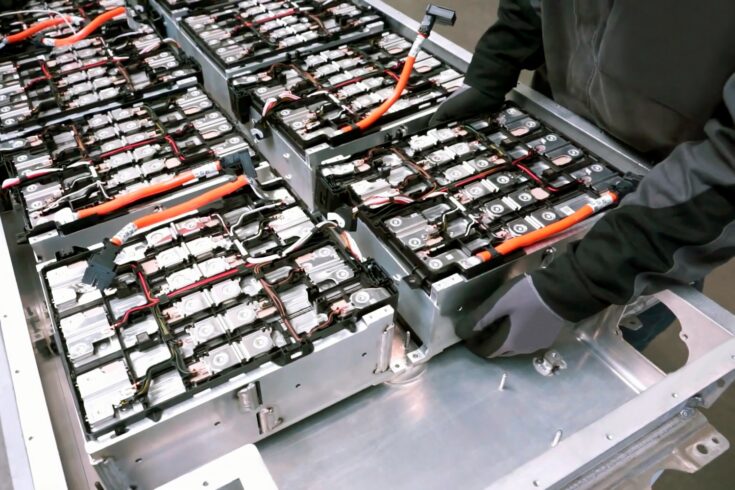We launched the Faraday Battery Challenge in 2017 to help the UK to meet its climate commitments. And to ensure that we prospered from the switch away from the internal combustion engine to batteries.
Our £330 million investment in research and innovation projects and facilities has laid the foundations for a strong battery industry in the UK.
However, now is not a time to sit on our laurels.
The deadline for the transition to zero emission vehicles has tightened since we launched the challenge and at a time of many new and unexpected global challenges.
The automotive supply chain needs our help to transition as much today as it did in 2017.
So, what have we achieved so far, why is it so important we continue to invest and where should that investment now go?
Creating a high-tech battery industry
I joined UK Research and Innovation as director of the Faraday Battery Challenge in 2018 after more than 30 years in automotive product development, including 10 as a director of engineering research. I saw this role as an exciting opportunity to help create a high-tech, high-value, high-skill industry in battery technology.
We have come a long way since then.
The Faraday Institution, set up with funding from the challenge, is a flagship battery research programme employing 500 scientists across 27 institutions and working with more than 50 businesses on 10 large-scale research projects.
These projects range from the optimisation of current lithium-ion technologies to development of next-generation battery technologies and recycling of battery materials.
We have built the UK Battery Industrialisation Centre, where UK businesses can develop and refine their battery manufacturing processes at the scale they need to move to industrial production.

Exterior photo of the UK Battery Industrialisation Centre (credit: UK Battery Industrialisation Centre)
Our collaborative research and development programme has supported more than 140 organisations working on more than 80 projects.
It has built and grown a thriving community of high-technology businesses right across the country.
It has substantially improved lithium-ion battery performance and offered new solutions that have the potential for globally significant breakthroughs in performance, weight and cost.
Several businesses supported by this programme have now grown to the point of attracting hundreds of millions of pounds in follow-on private investment.
Gigafactory investment is coming to UK
We are beginning to see significant results. The electric vehicle battery manufacturing startup Britishvolt is planning a gigafactory in Blyth, Northumberland, which is scheduled to produce its first batteries in 2024.
Envision AESC has announced a new gigafactory next to its facility in Sunderland. AMTE Power has also announced plans for a megafactory in Dundee.
I anticipate at least one further gigafactory and several supply chain announcements in the coming months.
These developments are vital in maintaining a strong and prosperous automotive industry in the UK.
Make no mistake – the challenges still facing the UK automotive industry are very real and specific. They come on top of the global challenges all industries face from the COVID-19 pandemic, war in Ukraine and the rising cost of living.
When we launched the Faraday Battery Challenge, the Committee for Climate Change was suggesting 50% of new car and van sales would be battery electric or plug-in hybrid by 2035.
Bringing forward deadlines for zero emission vehicles means we are now looking at 100% of new cars and vans being zero emission at the tailpipe by 2035.
This is a serious challenge for manufacturers that base their profitability on 10 to 12 years of payback from a particular vehicle platform. It means potentially lower returns from existing models and having to invest more quickly in their zero emission replacements.
Rules of origin requirements in the UK-EU Trade and Cooperation Agreement also mean battery packs must substantially originate in the UK or EU for cars to be tariff-free for export into the EU.
Meanwhile, the sales of electric vehicles are increasing rapidly as the technology gains consumer confidence and customers look for ways to mitigate the rising cost of fuel. Manufacturers face a race to satisfy that demand.
The challenge for manufacturers is immediate
The challenge then remains immediate. The so-called battery technologies of the future, including solid-state batteries, are still some way off and require sustained investment in scientific research to solve the remaining barriers to commercialisation.
We must ensure UK manufacturers have the support they need to transition to the battery technologies of today, where many technical challenges and opportunities for innovation remain.
That means helping manufacturers to switch platforms to zero emission vehicles, a process supported by late-stage research and development and industrialisation programmes funded by our colleagues at the Advanced Propulsion Centre.
We at the Faraday Battery Challenge can help by supporting critical innovation projects and processes that otherwise may not happen without government intervention.
We must support our strong chemical companies to:
- pivot their activities to a battery supply chain
- build the communities and the skills to support this supply chain
- help new UK businesses to develop commercial battery technologies by giving them access to:
- world-class facilities
- potential customers and investors.
Expect to see more funding opportunities
We must invest now to make the UK a desirable host for the minimum five gigafactories the Advanced Propulsion Centre suggests we need by 2035 to support a UK electric vehicle industry.
Those gigafactories are critical to the twin goals of supporting the UK to meet climate commitments and ensuring that we prosper from the switch away from the internal combustion engine to batteries.
Failure to secure them is unthinkable as we face the simultaneous loss of a £10 billion industry that makes 2.5 million engines a year.
So, expect to see more activity from us over the coming months and years as we seek to drive home the advantage we have already built in the UK.
The Faraday Battery Challenge will continue to build a science superpower of batteries.
We will support the UK’s world-class battery facilities and the growing and innovating businesses that are building a battery supply chain for our future prosperity.
Find out more about us at the Faraday Battery Challenge page and sign up for updates on funding opportunities.
Top image: Credit: Aranga87, iStock, Getty Images Plus via Getty Images




